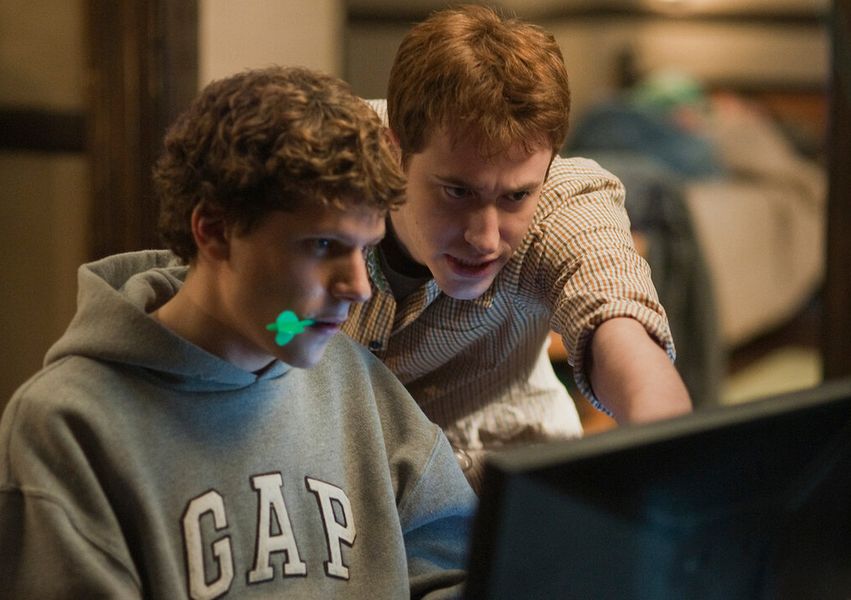With over 2.7 billion active users recorded in the second quarter of 2020, Facebook has continued to maintain its dominance in the industry as the social media platform. The website has almost become synonymous with social networking itself. Founded in 2004, Facebook’s meteoric rise has not been a picture-perfect one by any means.
The platform has been abused in countless ways, from privacy breaches to even initiating a genocide. In the middle of all this is Facebook’s CEO Mark Zuckerberg, the Harvard drop-out billionaire who inspired a generation of entrepreneurs and became the subject of some pretty funny memes.
However, there’s a cinematic representation of the company which remains one of Facebook’s most creative representations. Based on a book called The Accidental Billionaires by Ben Mezrich, it has been ten years since David Fincher’s film adaptation came out: The Social Network. The film received commercial as well as critical acclaim, grossing $224.9 million worldwide. It also earned eight Academy Award nominations and won in three categories, including one for Aaron Sorkin’s brilliant adapted screenplay. “What attracted me to [the film project] had nothing to do with Facebook,” screenwriter Aaron Sorkin said of the project. “The invention itself is as modern as it gets, but the story is as old as storytelling; the themes of friendship, loyalty, jealousy, class and power.”
The film did not just impress audiences but other filmmakers as well. “It’s The Social Network, hands down,” acclaimed filmmaker Quentin Tarantino said when asked about his favourite film of the last decade. “It is number one because it’s the best, that’s all! It crushes all the competition.” So what exactly is so special about the 2010 biopic? For one, it chronicles the controversial origins of one of the most important innovations in recent history. More importantly, it is ominous in its predictions. The narrative is structured in the form of a deposition, as if the only way that Facebook’s questionable story can be told is through legal proceedings.
Jesse Eisenberg is fantastic as the future billionaire, rarely smiling and never saying thank you. It is almost painful to watch that what started it all was “FaceMash”, a misogynistic project in which Zuckerberg took pictures of female students without their consent and built a website where they are ranked on the basis of their appearances. “One weekend I wanted to build this prank website, FaceMash,” Zuckerberg recalled. “I basically sat here for, like, three days straight, and just coded this thing. And it was a prank. It was kind of funny but also a little bit in poor taste.”
Accused of stealing the idea for the website from future Olympians and entrepreneurs Tyler and Cameron Winklevoss (the subject of Mezrich’s 2019 book Bitcoin Billionaires), The Social Network recounts how Zuckerberg built his empire on the basis of jealousy. He even screwed over his best friend and co-founder Eduardo Saverin (played by Andrew Garfield) by diluting his shares in the company. Fincher’s film paints an exceptionally unflattering picture of tech billionaire Mark Zuckerberg.
E-mails that were leaked during the 2014 Sony data breach showed that Zuckerberg had been trying to stop Fincher’s film from being made. Obviously, he wasn’t successful and the billionaire resorted to calling the film “fiction” in a 2010 interview. It is true that Sorkin exercised his creative liberty in some moments of the film, most memorably in the opening sequence where his erstwhile girlfriend breaks up with him for his unabashed arrogance. If anything, these dramatised exaggerations add to the Faustian image of Zuckerberg. “From its facts to its essence to its portrayal, I think that was a very unfair picture,” Facebook COO Sheryl Sandberg said. “I still think it forms the basis of a lot of what people believe about Mark.”
Since then, Zuckerberg has faced even more controversies: the largest of those being the Cambridge Analytica scandal. When Zuckerberg arrived to testify before Congress, people were immediately reminded of Eisenberg’s portrayal in Fincher’s film. That is the undeniable legacy of The Social Network, one that Zuckerberg has been trying very hard to escape. Ultimately, he gave in and screened the film for his employees. “We had some fun with it,” Mark Zuckerberg said during a Q&A. “I mean we knew that everyone who works at Facebook was going to want to see it anyway, because how often does someone make a major movie about your company?”
Fincher’s film is still relevant, even more so today because it shows how impactful inter-connectivity can be in the age of the internet and how easily it could all go wrong. From intellectual property rights to ethical codes to friendship, everything is blurred when that amount of money gets involved. The Social Network is an unflinching look at the poor motivations and the contentious history of an “idea that changed the world.”
As for Facebook, its executives still call it “the movie”.
Watch The Social Network on Netflix.
